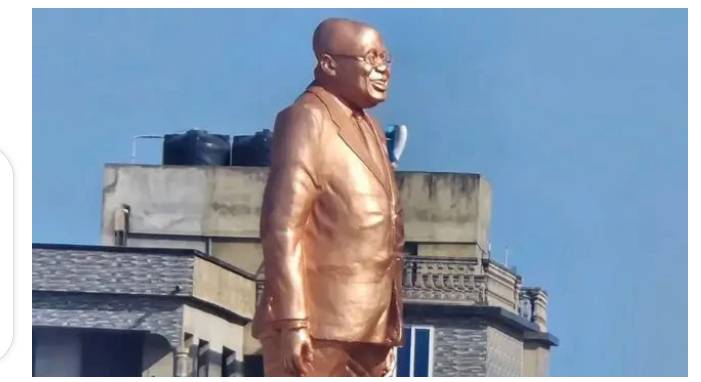In the aftermath of Ghana's 2024 general elections, an event both symbolic and dramatic unfolded in the Western Region. A statue of outgoing President Nana Addo Dankwa Akufo-Addo, erected at Effia Nkwanta in Sekondi, was dismantled by disillusioned supporters following the resounding defeat of the New Patriotic Party (NPP) to the National Democratic Congress (NDC). The act, captured and widely shared on social media, has become a vivid emblem of the political and social unrest brewing in the nation.
The Monument and Its Controversy
The statue, meant to honor Akufo-Addo for his developmental initiatives, was installed near the Effia Nkwanta Regional Hospital. Western Regional Minister Kwabena Okyere Darko-Mensah had previously lauded the monument as a testament to the president's contributions to the region. However, its strategic placement soon drew public criticism.
For many residents, the statue stood as a glaring contradiction. The hospital—struggling with dilapidated infrastructure and inadequate medical equipment—became the focal point of their frustrations. Critics argued that prioritizing a statue over essential healthcare infrastructure was a blatant disregard for the region’s pressing needs.
The Toppling: A Symbol of Discontent
On November 7, 2024, images of the toppled monument began circulating online. The once-majestic statue, now lying in ruins, was a stark representation of the anger and disappointment felt by NPP supporters and ordinary Ghanaians alike. While some party loyalists had celebrated the statue as a marker of the NPP’s achievements, others viewed its destruction as an act of catharsis—a release of pent-up frustration over perceived governance failures.
A Party in Decline
The NPP's election defeat marked a turning point in Ghana’s political landscape. Widespread economic hardships and allegations of misplaced priorities plagued the Akufo-Addo administration’s final years. For many Ghanaians, the statue’s fall symbolized the broader collapse of public trust in the government.
Economic Struggles and Public Outcry
Under Akufo-Addo’s leadership, the nation faced increasing economic challenges, including inflation, unemployment, and rising costs of living. These hardships were compounded by accusations of neglecting critical sectors such as healthcare and infrastructure. The statue’s placement outside a struggling hospital crystallized these frustrations, turning it into a lightning rod for criticism.
Voices from Sekondi
Residents of Sekondi expressed mixed emotions about the monument. While some appreciated the recognition of Akufo-Addo’s efforts, many questioned the timing and relevance of such a tribute. “We need roads, schools, and better hospital facilities, not statues,†lamented one resident. This sentiment echoed across the region, amplifying calls for a reevaluation of national priorities.
Lessons for the Future
The toppling of Akufo-Addo’s statue is a wake-up call for Ghana’s political elite. It underscores the need for leaders to align their actions with the genuine needs of the populace. Monuments and tributes, while symbolic, cannot replace tangible progress in critical areas like healthcare, education, and infrastructure.
Engaging the People
As Ghana moves forward, it is crucial for both the incoming administration and opposition parties to foster open dialogue with citizens. What do Ghanaians truly need to improve their lives? How can leaders ensure that developmental projects reflect the priorities of the people? These are questions that demand immediate attention.
A Call to Action
For readers, this story serves as a reminder of the power of collective action and the importance of holding leaders accountable. What changes do you want to see in your community? How can you participate in shaping a better future for Ghana? Share your thoughts and ideas in the comments or on social media platforms.
Conclusion
The fall of the Akufo-Addo statue is more than just an isolated incident—it is a narrative of discontent, a cry for change, and a lesson in governance. As Ghana turns the page to a new chapter, the voices of its people must guide the path forward. Only by addressing the root causes of disillusionment can the nation truly progress, leaving behind not just broken statues, but also broken promises.



